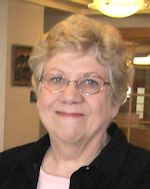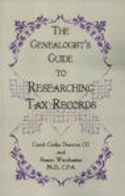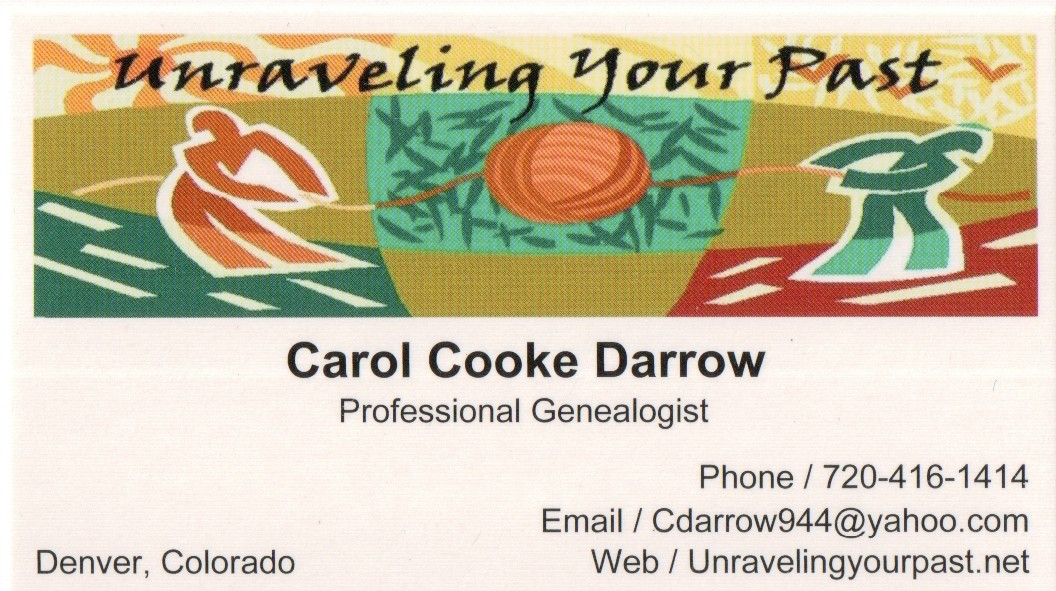Every Genealogical Search is Different
Every genealogical search is personal - whether you're looking for your great-grandparents or seeking credentials to join a lineage society. Every search is different and some are certainly easier than others. You may want to do your own research and don't know where to begin. Or you may have made a lot of progress until you hit a brick wall.
My goal for you is "Family Research on a Budget." If you've decided to do some research into your family history and need help, you can hire a professional researcher who can kick-start your research, resolve difficult identification problems, read antique handwriting, plat land holdings, and identify documents critical to your success. As a professional genealogist, I am qualified to do that research.
"Carol is a very experienced genealogist and she has a way of sharing her experience with her audience that informs, entertains, and challenges them to look deeper into their own family histories. Anyone, even non-genealogists, who have the opportunity to hear her speak should not pass up the chance to do so." -- Brad Morrison, Castle Rock
Carol Cooke Darrow, Professional Genealogist

Carol Cooke Darrow is a professional genealogist who works as a lecturer and researcher. She has a degree in history from the University of Texas and is the co-author of The Genealogist's Guide to Researching Tax Records published in 2007. She is available to present at your genealogical meetings nationwide. Her current schedule of lectures and presentations is listed below.
 Carol Cooke Darrow and Susan Winchester are co-authors of the Genealogist's Guide to Researching Tax Records. The book is a how-to guide to help you identify, locate, and understand the wealth of information available in these annual records. Tax records can be as helpful as census records in locating ancestors who lived before the first census in 1790 or who lived in areas with lost census records. The book was published by Heritage Books and is available at www.HeritageBooks.com
Carol Cooke Darrow and Susan Winchester are co-authors of the Genealogist's Guide to Researching Tax Records. The book is a how-to guide to help you identify, locate, and understand the wealth of information available in these annual records. Tax records can be as helpful as census records in locating ancestors who lived before the first census in 1790 or who lived in areas with lost census records. The book was published by Heritage Books and is available at www.HeritageBooks.com
Let me help you with research in:
Professional Research Services
Here are a few of the professional research services available:
Hourly rates start at $35 per hour.
Free Research Services
Cancelled until further notice due to Covid-19 precautions. I offer free research services at these two locations:
"Listening to Carol's presentations and her advice allowed me to successfully conduct the initial research of the family trees of both my father and mother. Her guidance and encouragement helped me write a book about my mother's genealogy--much of which had been lost with the family's emigration to the U.S." -- Sandra Gill, Thornton
Presentations and Lectures
College Hill Lecture Schedule
College Hill Library, WPL
3705 West 112th Avenue
Westminster, Colorado
No classes May through August
All classes by ZOOM; register on Westminster Public Library website (find class by date). You will receive an email link to the Zoom meeting Friday evening before the program.
| Date | Topic | Location |
|---|---|---|
| Saturday, October 7, 2023 1:30 - 3:30 pm |
Settling in America: Where Did Immigrants Live and Why? |
Zoom Registration opens Oct. 1, 2023 College Hill Library Zoom Meeting |
| Saturday, December 2, 2023 1:30 - 3:30 pm |
Writing Up the Family Tree: Preserve Your Family History |
Zoom Registration opens November 25, 2023 College Hill Library Zoom Meeting |
| Saturday, February 3, 2024 1:30 - 3:30 pm |
Becoming An Expert at Ancestry.com |
Zoom Registration opens Jan 25, 2024 College Hill Library Zoom Meeting |
Free Genealogy 101 Class [ZOOM Meetings]
| Event/Zoom Meeting | Date |
|---|---|
| Sign up at cogensoc.usand click on Genealogy 101 icon to register. | 2nd Saturday of every month, 10:00 am – noon |
Free Genealogy Presentations [ZOOM meetings]
| Event/Date | Topic | Location |
|---|---|---|
| Wednesday, Sept. 13, 2023 1 pm – 3 pm |
Introduction to the 1950 U.S. census | Foothills Genealogical and Historical Society - Check website foothillsgenealory.org for Zoom registration. |
| Tuesday, Jan. 2, 2024 6:45-8:45 pm |
Topic: TBD | Boulder Genealogical Society - Check website for Zoom Registration at bouldergenealogy.org. |
WriteNOW Writing Group [ZOOM Meetings]
Classes on Zoom are held Sunday, 1:30 to 3:30 pm on ZOOM. Register to visit the WriteNOW group (thru the Colorado Genealogical Society website) and you will receive a link to enter the meeting. You must register first to enter the ZOOM meeting.
| Event/Date | Topic | Location |
|---|---|---|
| Sunday, September 10, 2023 | Personal introductions; possible projects and writing styles. Assignment for October: Write 500 words about one ancestor (or continue on your current project).Send to Carol no later than Thursday, Oct. 5, 2023. |
ZOOM meeting |
| Sunday, October 8, 2023 | Adding details and other meaningful information into your story. Assignment for November: Add at least 500 words to your ancestor’s story (or continue on your current project). Send to Carol no later than Thursday, Nov. 2, 2023. |
ZOOM meeting |
| Sunday, November 12, 2023 | Narrative Style: past, present, or future tense; first person or third person; jumpy transitions, punctuation and usage rules. Assignment for December: Write 500 more words about your ancestor (or continue on your current project). Send to Carol no later than Thursday, Dec. 7, 2023. |
ZOOM meeting |
| Sunday, December 10, 2023 | Discuss narrative style and examples, transitions, pacing your story. Assignment for January: Write Introduction to your project and at least 500 more words. Send to Carol no later than Thursday, January 11, 2024. |
ZOOM meeting |
| Sunday, January 14, 2024 | Discuss clarifying confusing relationship references and handling difficult and sensitive topics. Assignment for February: Write 1,000 words on your project. Send to Carol no later than Thursday, Feb.8, 2024. |
ZOOM meeting |
| Sunday, February 11, 2024 | Discuss photo editing, copyrights, illustrations including post cards, paintings, clip art, maps, diagrams. Assignment: Write 1,000 more words on your project. |
ZOOM meeting |
| Sunday, March 10, 2024 | Discuss manuscript preparation, Word, pdf, styles, layout, page numbering, front material. | ZOOM meeting |
| Sunday, April 14, 2024 | Discuss electronic publishing including Office Depot, Lulu.com, others. | ZOOM meeting |
| Sunday, May 19, 2023 3rd Sunday in May | Presentations of projects. Assignment for the summer: Finish your current project; plan for your next project. |
ZOOM meeting |
Seminars
| Event/Date | Topic | Location |
|---|---|---|
| TBA | . | . |
Lecture Topics
New Topics!
The 1950 U.S. census will be released to the public on April 1, 2022. Challenges include a huge growth in urban populations and a preliminary index created by Optical Character Reading software.
Immigrants were typically pushed to leave their home country but the welcome in the new country was not always assured. Americans envisioned a melting pot where differences would be submerged. Immigrants often sought to recreate their homeland in America.
Information such as occupation, education, even cause of death supplemented with newspaper stories, county histories, maps, journals and diaries can help you round out the picture of your ancestor and the world he lived in.
Whether seeking gold, freedom or more land, Americans moved across the continent. As new territories opened up, people felt the need to move westward.
Deciphering the messages written in stone on tombstones can enrich your understanding of your ancestor.
Emigration is the process of leaving one’s country of residence to live elsewhere. Immigration is the process of moving to a new homeland. The new homeland may be a matter of chance, opportunity, invitation, or desire. There is a push/pull effect – reasons why someone would feel the need to leave their homeland and reasons that would attract emigrants to a particular new home.
The American continent offered land to entice immigrants from around the world. Land was given away by colonial governors, awarded as military bounty land, distributed by lottery, sold by cash sales by the U.S. government and distributed by the Homestead Act of 1862. How did your ancestor get land - and how much did he get?
Whether you're writing a compiled genealogy or a family history, putting the facts on paper and bringing the ancestor to life can be challenging and fun.
To succeed at European genealogy research, you must learn about the standard records of the country of your ancestors through websites, books, maps, and genealogy societies devoted to that country. The growing number of online resources will help to speed you on your way.
Collecting and recording information about your ancestor on specialized charts and timelines can help you clear up the confusion and clarify the story of your ancestor.
Additional topics which are currently available:
The things that seem to be standing in the way of your genealogical research may be easy to overcome when you have carefully identified the road block and learned effective ways to overcome it.
Castle Garden opened as a New York City facility for processing the crowds of immigrants arriving between 1855 and 1890. Ellis Island, a federal immigrant receiving station replaced it in 1891.
Use online tools to locate the final resting place for your ancestor and find obituaries.
Leaving your home country to set sail for America was sometimes a wrenching decision. The trip was filled with dangers and hardship, and the welcome was not always friendly. Learn about your ancestor's decision to leave the home country and the experience of journeying to America.
Most genealogy records are created on the local level so it's vital that you learn as much as possible about the county boundaries, history, maps, population, geography, religions, crops, and occupations of your ancestor's hometown. When you become an expert on that location, you will find the records you're looking for.
Becoming a citizen was not always easy and finding naturalization records can be a challenging task.
Our ancestors' marriages are often idealized -- we think of them marrying for life and living happily ever after. But research often uncovers women living apart from their husbands, women abandoning their homes and families, and even divorcing or being divorced. Learn how to recognize and account for women who don't fit into the "married for life" model.
You're faced with a pile of documents, a camera card full of unlabeled photos, and more than one flash drive full of microfilm pages. When it's hard to know where to start organizing, you need to start with a goal and focus on a plan to meet that goal. The plan may include a file folder system, an index of your photos, a timeline of the life of an ancestor, or a tracking chart of records for an ancestor.
Maps come in all shapes and detail. Finding the right map can lead you all the way back to your ancestors.
People are affected by the belief system, the laws, the climate, and the technology, as well as religious and ethnic influences of the time they live in. We want to know why they do what they did.
Learn how the administration and probate process can tell us about the life of the deceased and clarify family relationships.
"I always learn something new when you are the speaker!" -- Susan Seager, Weld County
Selected Genealogical Links
- Colorado Genealogical Society
- Association of Professional Genealogists
- Atlas of Historical County Boundaries
- Board for Certification of Genealogists
- Black Genealogy Search Group [Denver] .org
- Colorado Society of Hispanic Genealogy
- Cyndi's List of Genealogy Sites on the Internet
- Denver Public Library: Western History and Genealogy
- Directory of Genealogy Libraries in the USA
- Find A Grave
- GenForum
- Classic LDS Family History Library Catalog
- LDS FamilySearch Record Search
- Jewish Genealogy
- Steve Morse's Genealogy Search Tools
- NARA - Genealogy
- National Archives at Denver
- National Genealogical Society
- RootsWeb.com
- Social Security Death Index (SSDI)on Ancestry.com
- State of Colorado Archives: Historical Record Search
- U.S. Civil War Soldier and Sailor System (by the National Park Service)
- U.S. Census Bureau: Genealogy
- The USGenWeb Project

.....
